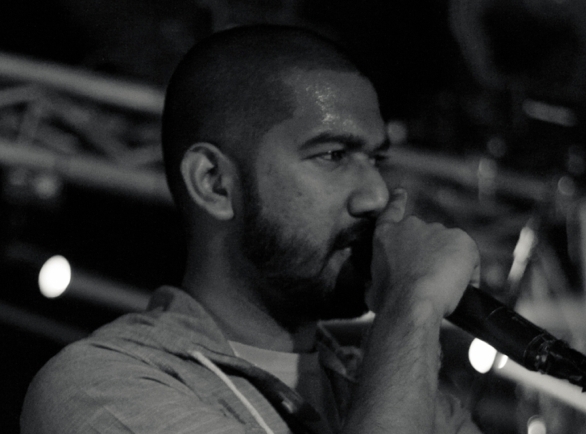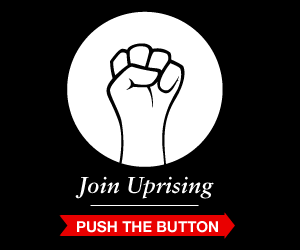UAE Rappers and Soul Singer
Posted on 11th May 2012 by Madeleine Butcher in Blog
As Uprising has said before, the best big ideas come from creating something genuine and good. They also require the people who appreciate them to tell others to do the same. A talented, new music movement is emerging in the Middle East, in the unexpected location of Dubai, but where it falls down is in spreading the word in a region where it’s a bit harder to shout about things that aren’t mainstream.
In the rich-man’s playground, three unlikely heroes are fighting for ears, minds and hearts. They are African-Emirati soul singer Hamdan Al Abri, Sri Lankan MC Jibberish and Lebanese Female HipHop trailblazer Malikah. They have talent by the bucketload, but not the immediate resources of the media metropolises of the world, and are trying their best to rectify this.
I moved to Dubai from New York 11 months ago, and my first stop was gigs. I knew I wouldn’t get the same choice New York offers, and with just Time Out magazine and no legal bill-posters to guide my way, I relied on Social Media, and friends of friends who moved here before me. The world gets smaller when you move through circles with the same interests, which music encapsulates and alcohol lubricates.
In New York and London, with so much competing for attention, artists are often pushed to find a niche or USP, which can make it embarrassing to like or aspire to something too ‘obvious’, like Stevie Wonder, or Wu Tang. You can like the Bass Guitarist off Stevie’s Innervisions, or the producer of Nas’s second album, but don’t like the ‘obvious’ legend, just as all new artists have to start with a distinctive sound. On the other hand, all of the big acts that infiltrate every corner of the globe, like Adele or Jay Z in rural Nepal and Sri Lanka, homogenize the intricacies of regional sounds, even in global genres.
This applies to art too, and the UAE is wedged firmly between big bucks from all over the world, a multicultural society that is a lot less integrated than places like Brooklyn, Marseilles or South London, and a music scene which either eschews its cultural routes in favour of Internationalist (and largely American style) or goes full throttle and can end up caricaturizing themselves.
And the Khaleeji regions have two more obstacles for artists. First, the UAE, Qatar, Bahrain, Oman and Kuwait tend to respect their own artists if they can prove themselves internationally before being taken seriously here, so there is a continual exodus of artists to London, LA and New York. Second, in countries where much of the media is heavily controlled by governments often run by ruling families, artists cannot be seen as creating dissent, and in each of these oil-rich countries, where the populace is generally well off and provided for, there is, arguably, less to argue about, (out loud).
Coke Studio has done a brilliant job of transcending this in Pakistan, India and Lebanon, taking contemporary and traditional artists and giving them an incredible platform that is doing brilliant things for regional music.
Back in the UAE, Hamdan, Malikah and Jibberish are trying to make a movement. It’s not a ‘Scene’, or the forging of a new uniform style like UK Grime or Dub.
All in their 20s, with different styles, genres and content, they occasionally work together, but have joined forces to strip back musical and political cliches, organising performances and events, encouraging artists across the region to speak from the heart and use their heads without aping the mainstream. It’s a word of mouth thing, and a handing-out-CDs at gigs thing, but a few blog posts, articles like this and just one Media Corporation to add a couple of songs to a drive-time playlist could tip it.
This challenges the asserted view that certainly in Hip Hop and contemporary R&B, it’s impossible to get 'Big' without; mimicking tricks and language used Stateside or in Europe, using culture as a badge, attacking something or someone, or getting angrily and sometimes aimlessly political about both the Arab Spring and the perception of Islam in the media.
99% of Hip Hop artists in the region talk about Politics, and Malikah does too, but she’ll stress that she only talks about what she knows, and that as a ‘social commentator’, Hip Hop for her “is about exchanging knowledge. It’s a big responsibility and you have to know what you’re talking about”. She speaks with passion about stopping sectarianism, being an Arab, fighting stereotypes, being an Arab woman, (with women alone being just 7% of the Hip Hop world).
As well as giving a voice to a hugely underrepresented group globally, she is a fireball of energy on stage, and made to do this. A sometimes obsessive fanbase, expect direct responses if there’s ever a photo of her with too much midriff, or in the same scene as someone with a drink in their hand, and she responds with care that doesn’t diminish her passion one bit.
Jibberish, from Sri Lanka, makes subtle, thoughtful and unusually honest Hip Hop that, to listen to, feels like reading a diary. Subject matter changes from song to song; funny, angry or confident, and stylistically influenced by the more ‘cerebral’ Hip Hop of about 20 influential USA East-Coast rappers in the 90s, but essentially about him, this region and the people in it. A solo artist and one third of ‘Employees of the Month’ he and his bandmates are very much the leaders of many groups here in the same genre, largely because they take the same care to write and produce as seasoned artists, without any of the support of the big labels.
Hamdan Al Abri is a soul singer-songwriter who would sit high on any roster in New York, London or LA, but has lived here all his life and sees no need to run elsewhere. He is pure soul. Like Malikah and Jibberish, he performs at warehouses, exhibitions, streetparties, sponsored events and the Super Hotels around town, and is the unintentional central figure of this movement thanks to his sheer bucket-fulls of talent. There’s not much more I can say objectively without harping on about how awesome he is.
What they lack is a media voice, a cynical, bombastic record company to push them and shout their wares. Theirs is not an endorsed scene. It gets the odd interview, but while they play at sponsored events, nobody on the outside is saying “This is a movement – this is stripped back ‘conscious’ music from the Middle East”.
I am. Or as of getting their giveaway CDs last week, I’m going to start. This is first time they have been grouped together based on what they’re trying to do. And really, all they want to do is spread good music, perform, share, inspire and be inspired. And isn’t that how movements start?
blog comments powered by Disqus







